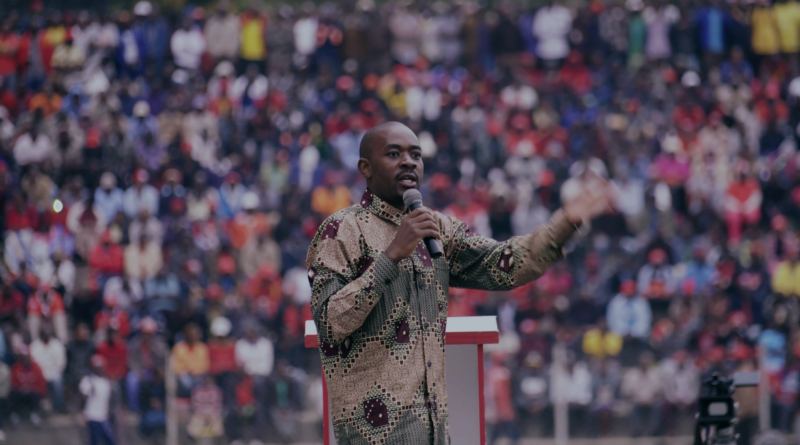REVIEW: ‘President’ depicts the changing political scene after Mugabe
Photo: President, a new documentary by Camilla Nielsson, follows political challenger Nelson Chamisa during the 2018 presidential election in Zimbabwe. Photo courtesy of Greenwich Entertainment / Provided with permission.
Camilla Nielsson’s new documentary, President, showcases the 2018 presidential election in Zimbabwe following the coup that ousted longtime leader Robert Mugabe. The director follows candidate Nelson Chamisa, the president of the political party Movement for Democratic Change (MDC), who takes on Emmerson Mnangagwa, the man who took over the country’s presidency from Mugabe and leader of the Zimbabwe African National Union – Patriotic Front (ZANU-PF).
This electoral contest was momentous for Zimbabwe because it represented the first time in decades that a real democratic wind was blowing throughout the country, which is located near South Africa, Botswana and Zambia. The nation faced many hardships under Mugabe’s rule — that’s an understatement — so the election was a chance for beleaguered residents to take to the ballot box and vote for their favorite candidate, with the hope of bringing about real change in the nation.
As Nielsson’s film shows, the campaign for president and the ultimate election did not produce the peaceful results and electoral confidence so many people were hoping for. Yes, there are scenes in the documentary that show massive campaign rallies where Chamisa, the challenger, is able to speak to throngs of people who show their praise with arms raised and choruses of affirmation, and generally these events occur without incident. However, there are other scenes involving military officials being dispatched to break up protestors waiting for election results, spraying them with hoses and shooting guns in the streets, violent acts that led to deaths in the run-up to the official results being shared with the public.
The film is undoubtedly more interested in Chamisa’s campaign than Mnangagwa’s, and that is likely due to access issues. Nielsson has seemingly unfettered contact to the challenger and his campaign staff, following them to rallies, strategy meetings and news conferences. In these scenes, Chamisa comes off as a motivational speaker who keeps a calming presence while his staff deal with frantic legal questions and ever-changing logistical demands.
Mnangagwa, on the other hand, is seen mostly through advertisements and carefully curated press events, almost at a distance, while his challenger commands large crowds amid countrywide grassroots efforts. This dichotomy of seeing one candidate so closely and the other at a distance makes sense, but also proves frustrating. However, it’s understandable that Nielsson stays focused on Chamisa; his ascendancy represents the change many Zimbabweans were hoping for, and he likely welcomed the documentary team tagging along. One could also argue that President is enamored with the process of politics more than the messaging of individual platforms; after spending 120 minutes with these leaders, it’s still unclear what exactly they stand for.
For those who follow the political news from this African nation, the result and aftermath of this historic election should be known before watching the movie; however, this insider’s look at the frustrations and fight for democracy should still prove revealing. The scenes command attention and sometimes shock the viewers, especially when a protest starts out peacefully and then descends into violence, or when military officials try to clear the press from a news conference, or when lawyers are barred from entering a courtroom and eventually have to relinquish their laptops and phones, leaving one attorney to rely on memory and hastily written notes to argue his case. These are scenes emblazoned with great import for the people of Zimbabwe.
Nielsson’s film is a followup to her other Zimbabwe-set documentary, Democrats. Taken together the films offer a portrait of a country trying to find its political identity in the 21st century. There’s real hope showcased in the crowds, but there’s also a sense that ZANU-PF will find a way to rule no matter what. This makes President an important document of a movement’s attempt at change, even if the hopeful result is constantly put off again and again into the future.
The access that the director has with Chamisa is uncommon and thus revelatory. Few films can get this close to the political process, depicting the behind-the-scenes trials and tribulations of team members striving for purposeful change. Last year’s Mayor about Musa Hadid, the mayor of Ramallah, also comes to mind. By examining politics, governance and campaigns this closely, one hopes that transparency and the will of the people ultimately prevail. But as President so clearly shows, there’s a lot of work still to be done.
By John Soltes / Publisher / John@HollywoodSoapbox.com
President (2021). Directed by Camilla Nielsson. Running time: 2 hours. Now playing in movie theaters from Greenwich Entertainment. Rating: 




